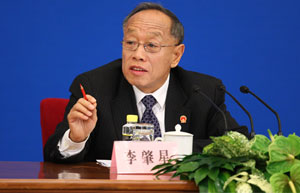Public supervision a cure for the cancer of corruption
By Tim Campbell (China Daily)
Updated: 2011-03-09 07:38
In China's ongoing battle against corruption, the comments of Premier Wen Jiabao have been right on target.
During a recent online chat, Wen said the government's anti-corruption campaign will be a "primary task" of the Communist Party of China, adding "a government will not be corrupt if it is under the people's supervision".
It is a cancer that slowly spreads, corruption is, eating away at the foundation of society, feeding anger and eroding political legitimacy.
The battle against corruption is not unique to China, of course. It is to some extent pretty much everywhere.
In India, for example, corruption in the world's largest democracy is so apparently widespread that a colleague from the subcontinent once said: "If you are not corrupt, then why do you want to get involved in Indian politics?"
Across the East China Sea, an unending cascade of corruption scandals helped bring down the long-reigning Liberal Democratic Party of Japan when it lost the confidence of the people.
Even my homeland of Canada, which often gets very positive scores on international surveys, was hit by a scandal involving the misuse of public sponsorship funds that traced its roots to the top office in the land, dragged two prime ministers in its wake and eventually led to charges and even jail for several political movers and shakers.
Put in this perspective, China's battle against corruption is not unique, but it is nonetheless critical for the ongoing development of the country. Just last year, for example, the central government punished more than 146,000 officials for corruption, nearly 5,100 of whom were at the county level or higher.
Wen has suggested giving the public a larger role in oversight - a step in the right direction.
In Canada, the sponsorship scandal exploded onto the front pages after the country's auditor general - who monitors the country's books and makes regular reports on its finances - blew open the doors on the misuse of public money. (As expected, journalists eagerly await the auditor general's reports.)
In China, however, it is netizens who have frequently assumed the role of watchdog. They monitor how government leaders spend money and notice which ordinary officials drive surprisingly expensive cars, wear expensive watches and smoke expensive cigarettes.
One suggestion being considered for battling corruption in China is to reveal the assets of officials. Such a move would help expose wrongdoing while building trust with those officials who have nothing to hide.
Taking Canada as an example once again, politicians' salaries are public knowledge, as are their expense accounts - where they traveled, why, how much they spent and even what they paid for meals.
Yet such transparency has been somehow difficult to establish in China, even though the government has set out regulations for financial reporting.
The latest blue book by the Chinese Academy of Social Sciences showed that 86 percent of government administrations and 70 percent of city governments selected for analysis failed to pass its evaluation for transparency. Ironically, one of the agencies at the bottom of the list was the National Bureau of Corruption Prevention.
Tian He, the blue book's executive editor-in-chief, said most city governments failed to meet State Council regulations because of "a lack of determination from top officials".
And this is where the recent emphasis by Wen on the need to stem corruption hits home. While oversight by the public is invaluable, it requires the continued support of the country's leaders to send the disease of corruption into remission.







